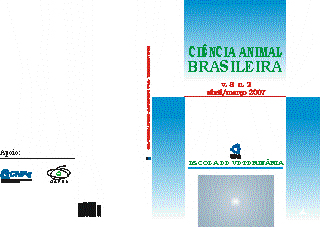CHARACTERIZATION OF CONSUMER AND THE MARKET OF PORK IN THE MICROREGION OF THE CAMPINA GRANDE - PB
Keywords:
Consumo de carne suína, pesquisa de mercadoAbstract
The aim of the present study was to characterize con-sumer profile and pork and pork-derived products market in the microregion of the Campina Grande - PB. Interviews were carried out with residents of the cities of Campina Grande, Queimadas, Puxinanã, Boa Vista, Serra Redonda, Massaranduba, Lagoa Seca e Fagundes. The questionnaire comprised 43 questions and was applied to a sample of 400 people. A direct interview form with closed questions was chosen and interviewers would make the questions and take note of the answers. To guarantee sample repre-sentation, a questionnaire application control plan was set up, which aimed at obtaining a homogeneous distribution of population regarding parameters of social layer, gender, and age. Collected data were processed using the Microsoft Excel software program. Among interviewees, 78.25% consume pork and 21,75% do not. Of these, 40.23% for being vegetarian, 21.68% find it, 12.00% greasy judge it loaded, 11.90% for medical restriction, 10.00% for health questions and 4.60% allege that they do not consume it for making regimen. He was clearly that the consumers of the microregion of Campina Grande who prevent to feed of pork and its derivatives not make it for the lack of information how much to the origin of this meat and how much to the nutricional quality of the same one.
KEY-WORDS: Consumer, market, pork, profile.
Downloads
Downloads
Published
How to Cite
Issue
Section
License
Copyright (c) 2007 Brazilian Animal Science/ Ciência Animal Brasileira

This work is licensed under a Creative Commons Attribution 4.0 International License.
Authors who publish with this journal agree to the following terms:
- Authors retain copyright and grant the journal right of first publication with the work simultaneously licensed under a Creative Commons Attribution License that allows others to share the work with an acknowledgement of the work's authorship and initial publication in this journal.
- Authors are able to enter into separate, additional contractual arrangements for the non-exclusive distribution of the journal's published version of the work (e.g., post it to an institutional repository or publish it in a book), with an acknowledgement of its initial publication in this journal.
- Authors are permitted and encouraged to post their work online (e.g. in institutional repositories or on their website) prior to and during the submission process, as it can lead to productive exchanges, as well as earlier and greater citation of published work (See The Effect of Open Access).




























